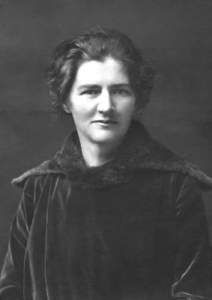Professor Jenny Butler, Oxford Brookes University (retired)
The day of the Casson Memorial lecture in 2004 was such an extra-ordinary one for me. It was an occasion when several events combined in ways that I could never have predicted. A time of enormous emotional, professional and intellectual significance that will be forever etched in my mind.
I have no special memory of the day when I heard the news that I had been awarded the Casson lectureship for the following year’s annual conference – but I know I was delighted and thrilled. I was proud of all that I had managed to achieve thus far and considered the award as a wonderful compliment from my fellow OTs. I knew that 2004 was the 50th anniversary of Elizabeth Casson’s death, and that some extra events would mark that anniversary. So, it was to be a special year. I probably also, on a less serious level, wondered what on earth I would wear!
In the March of 2004, I started pulling together some thoughts and notes and scribbles that I had made over the previous few months. I had been letting my ideas ferment, fizzle and bubble (I hoped) such that a coherent plan for the content of the lecture would emerge. I had also spoken with several people, including Jennifer Creek, and I had been reading around various topic areas. Unusually, I had the time to think and to write in the early part of the year, as I’d been diagnosed with breast cancer in December 2003 and had surgery in January, so I was off work. I was due to start chemotherapy in the middle of March. In these circumstances, I was aware that I might not be well enough to deliver the Casson lecture personally in June, but I was determined at least to write it – and if someone else had to read it out, so be it.
Writing this special lecture was an important goal for me during chemotherapy. One of the specific things planned for that 50th Anniversary year was to publish, in a (R)COT booklet, all the Casson lectures from 1973 – 2004. I desperately wanted mine to be in there. Thinking about, and writing, the lecture gave me a real focus on those days when I felt well.
In the end I chose to talk about 3 key areas: complexity, thinking and ethics. These topics resonated with the, then, current drivers at (R)COT and with my own academic work.
In common with other Casson lecturers, I wanted to include some pictures of Elizabeth Casson in the slides. I particularly loved the one of her as a strong young woman.

As well as the content, the practicalities of the lecture were important. I decided to have a micro-break in the 40-minute lecture slot where people could stand up and move around in order to aid concentration and attention. It is hard to just sit and listen to a talk after 2 or 3 days of hectic conference attendance, so I wanted to address that ‘nodding off’ possibility. The music I chose to use in the micro-break was Nina Simone’s ‘Ain’t got no (I got life)’.
Why? Firstly, I love Nina Simone’s singing and songs. Secondly, this particular song seemed to sum up the OT philosophy – firstly she lists the things she’s lacking (e.g. “I ain’t got no home, Ain’t got no shoes, Ain’t got no money….” etc) but then goes on to itemise everything that are her assets and strengths (e.g. “I got my smile,… Got my brains,….. I got life, I got my freedom… etc). A positive perspective to build her life on.
All the preparation and planning had been done ready for the lecture at the annual conference in Harrogate in mid-June. By the time the end of May came, it was clear that I would be well enough to give the Casson lecture personally. That was good news indeed for me.
As I said at the start, the day of the Casson lecture was a coming together of various strands of my professional life. I had been Chair of the R&D Board for (R)COT since 2001 but was stepping down from that role and was honoured to have been elected as Chair of Council for 2004 to 2005. I served as Chair for 2 years, in the end, finishing in 2006. I was doubly privileged, therefore, to be giving the Casson Memorial lecture and taking on the Chair of Council role on the same day. As if that wasn’t enough, the extra icing on the cake was that the Princess Royal was going to attend the conference and listen to my lecture!! What a plethora of gifts for me. This was clearly going to be a massive red-letter day.
I want just to mention here, that those two years as Chair of Council were so interesting, and thoroughly enjoyable. It was great fun working with all the staff at (R)COT headquarters, as well as with OT colleagues on Council, and meeting OTs throughout the country and abroad. A huge privilege. I also had a wonderful time working with the creative editorial team of OT News, writing my monthly ‘From the Professor’s Chair’ column, and helping to invent the cartoon that went with each month’s page.

Back to the Casson lecture day. What, there’s more…..??
Yes – the cherry on the icing on the cake arrived on the morning of the lecture. I had a call from the Head of Research in the School of Health & Social Care at Oxford Brookes University, telling me that I had been awarded my professorship. Talk about cups brimming over. This was especially poignant given my health difficulties and forthcoming course of radiotherapy due in September.
I recall that I thoroughly enjoyed giving the Casson lecture; I was delighted to have the Princess Royal there; I loved the music that was played halfway through, and was elated when the Council members got up and started dancing by their seats, along with a good number of other OTs in the audience. Looking now at the photos of that day, I can see that I had lost a lot of weight, that I didn’t ‘fill’ my suit; that my hair was thin and straggly….. but BOY, what a WONDERFUL day. I was on cloud nine.
The themes I chose to talk about in 2004 remain relevant today: complexity theory and OT as a complex intervention, are parts of the mainstream dialogue and understanding in OT research and practice; thinking as a skill and how it can be nurtured in educational settings for our emerging OTs remains pertinent in driving curricula and teaching methods; and of course ethical principles in practice and research are the bed-rock of our professional standards and conduct. The complex intervention of OT relies on how an occupational therapist thinks and acts with each individual, within each unique and complex context. So, the demands of this Covid world are not essentially new to OT – the challenge mostly lies in the accelerated rate of change in forever shifting sands. As OTs, we can have the confidence to think, problem solve and be innovative; to think ‘What do I know that can help me in this ‘unknown’?
My Casson memorial lecture day is one I’ll never forget. As a child growing up as part of an ordinary working-class family in London during the austere 1950’s and early 60’s I could never have imagined that I would ever have a career such as I had, largely as a result of the free educational opportunities that I was able to take up. It feels emotional to look back, even now all these years later. That everything came together on the one day, when my health and my future were so uncertain, was extraordinary. Truly memorable.
References
Barnitt, R. (1990). Knowledge, skills and attitudes: What happened to thinking? BJOT. 53(11) pp450-6.
College of Occupational Therapists (2003). Research Ethics guidelines. London: College of Occupational Therapists
Creek, J (2003) Occupational therapy defined as a complex intervention. London: College of Occupational Therapists.
Nina Simone – Ragni, Rado, & McDermot (1968). I ain’t got no (I got life). BMG Music.
Lisenced from BMG Records/UK/Ltd.
Post Script
For ideas about how to manage time for thinking, reflecting and being look at the Elizabeth Casson Trust ‘Finding Balance’ and ‘Treating Yourself with Compassion’ pocket guides.